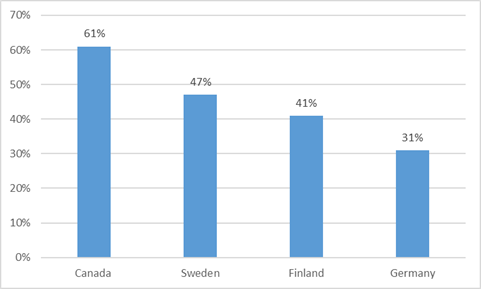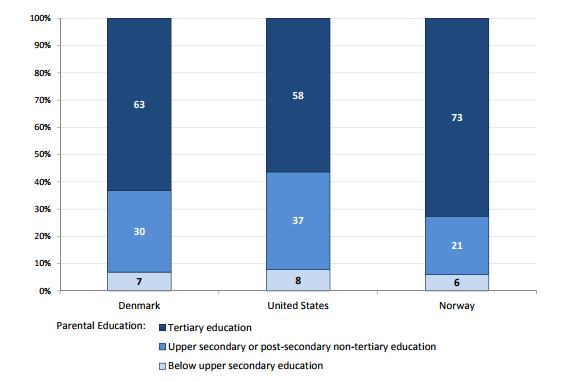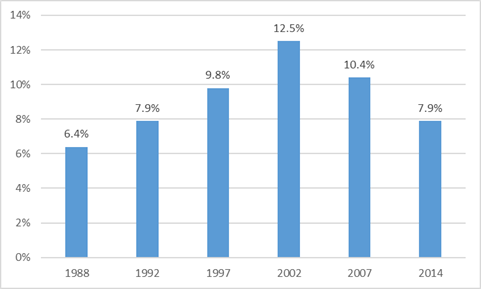So this weekend at the NDP convention, delegates voted in favour of a free tuition policy. Based on a totally unscientific scan of twitter afterwards, here are the ten most common arguments in favour of this move, and why each of them is wrong.
1. The federal government can totally impose free tuition on the provinces
No, it can’t. The best it could do would be to pay the provinces to reduce tuition, which could be difficult given that they all have very different participation rates and tuition structures, which means that finding a formula that would make sense for all of them would be difficult, if not impossible.
2. But we did it with Medicare!
Sort of. The starting imbalance in provincial spending was never really overcome and the program went from a 50-50 program to about a 20-80 program with the provinces picking up the extra tab. This is precisely why provinces have resisted promises of shared-cost programming ever since.
3. But it will make post-secondary education more accessible! Look at Germany and Finland and Sweden!
Not if by that you mean higher rates of access and attainment. Here’s a comparison of the four countries’ attainment rates among 25-34 year olds.
Figure 1: Tertiary Attainment Rates Among 25-34 Year-Olds, Selected OECD Countries
And yeah, these results have something to do with different structures of vocational education, but by pretty much any measure, attainment rates here are higher than they are in most if not all free-tuition countries. One reason for that: those tuition dollars pay for more places!
4. No, no! Not that kind of accessible! The kind of accessible that means students from lower-income backgrounds are more likely to go to higher education
Yeah, still no. Check out this paper from Nobel Prize-winning economist James Heckman and Rasmus Landerso which among other things looks at educational inequalities between big, bad, neoliberal America and cuddly Scandinavia. Or maybe just look at this graph, from page 30.
Figure 2: Proportion of 20–34 year olds in tertiary education, by parents’ educational attainment, Denmark, Norway, the U.S.
Or, you could look at data from Canada on participation by parental background in Canada, the best piece being this one from Marc Frenette. As I pointed out back here, over the past fifteen years the two provinces with the best record at narrowing the participation gap between rich and poor are Ontario and Newfoundland, which have had diametrically opposed policies on tuition. Which suggests that whatever is working, it’s not strictly (or maybe even at all) about fees.
Either way, the evidence for fees substantially changing the composition of the student body is essentially non-existent.
5. But tuition fees perpetuate intergenerational inequity!
This is a weird one. It seems to rest on the idea that richer parents paying for tuition while poorer kids have to borrow for theirs is how intergenerational inequality gets perpetuated. Simple answer: no. If you relieve everyone of the need to pay for tuition, there is nothing to stop parents handing that extra money on to their kids in a different way. End result: same levels of inequality, just a different mechanism.
6. Reducing Tuition Fees Will Eliminate Student Debt! And Student Debt is Killing a Generation!
Debt depends on a bunch of things, not least of all how generously you lend for living expenses. Sweden, famously, has free tuition but also higher average student debt than the U.S. That’s because they let students borrow huge amounts for living expenses with no needs test (something similar is going to start happening in Canada, btw, as we start taking away the need for students to contribute from labour earnings; the result of these policies will be that students will have better living conditions in school now, but more debt down the road.)
Also, student debt burdens are *much* lighter than they were a decade ago.
Figure 3: Percentage of Average After-tax Earnings of Graduates, 2 Years Out, Required to Service an Average Student Loan Debt
(if you want the calculations behind this you can find them back here).
7. Education is a right. It should therefore be free for all.
Food and shelter are also “rights” in the sense delineated by the UN Charter of Rights. But we don’t make those free. We provide direct assistance to those in need and in the case of housing put some very basic assistance (e.g. mortgage insurance) at the disposal of all. And we do that because if there is no market failure, then what’s the point of government intervention? This is why we target on need/income.
8. Free Education is Progressive Because It Helps The Poorest the Most
As I’ve pointed out numerous times, this is not the case, partly due to the fact that less affluent kids are already getting fairly large subsidies and because more affluent kids are more likely to enter post-secondary education. In fact, our best guess in Canada is that free tuition would probably direct three times as many dollars to families in the top income quartile than in the bottom. So in fact it actually helps the richest the most. Which is a pretty good reason not to do it, you ask me.
9. If you used these targeting arguments in healthcare, there wouldn’t be medicare!
The simple answer here is: health care is universal (in fact most studies show the poor are on average heavier users of the healthcare system). Post-secondary isn’t. So it’s not clear why there it’s inconsistent to argue for universal free health care and asking for targeted rather than universal subsidies in post-secondary.
The slightly more complicated answer is that medicare is first and foremost an insurance program against random catastrophic loss. Nobody knows how much health care they will need or when they will need it, so we use public funding as a way of pooling risk and sharing it. Unless you are prepared to argue that free tuition is protection against being randomly and catastrophically educated, this is a poor analogy.
10. You’re just a neoliberal shill!
An oldie, but a goodie. Unanswerable, really. You have me in the crushing grip of reason.




 Tweet this post
Tweet this post

This argument creates fake arguments from imaginary opponents in order to set up straw man arguments, completely facile and easy to defeat. I’ll take your position on tuition seriously when you begin to respond to real points made by real people.
For the nth time, the fact that they are not the arguments you would make does not mean no one makes them. Check my twitter timeline from yesterday.
If you can’t be bothered to reference or cite the actual argument in your post, it may as well not exist. I am left guessing as to who you intended to respond to. I am saying *nothing* about the arguments I would make. You can completely ignore my position; I don’t care. All I want to know is what *actual* arguments you are responding to, if any. From where I sit, if you can’t tell me that, then you’re just fabricating easy opponents to defend.
On a separate note, in matters of policy debate generally, the ‘principle of charity’ applies. That is, in order to defend or argue for a policy, you are required to address the strongest case against your position, not the weakest. http://philosophy.lander.edu/oriental/charity.html You make no effort to address actual strong arguments in favour of free tuition, instead simply chasing easy targets (which were possibly fabricated by yourself).
This is the behaviour of a shill, as opposed to be a pundit. If this is what you want to be, then fine. Just be aware that this is what you are doing.
As I’ve explained before, I don’t really feel it’s fair for me to pick on individuals talking in public forums like twitter on my blog. I have a megaphone and they don’t and it wouldn’t be fair to any specific individual I named.
Tell me what you think the strong arguments in favour of free tuition are. I’d be happy to take those on.
It’s less fair to misquote them and cite them anonymously so they have no opportunity to respond.
But like I say, you can be what you want to be, just be aware of what you’re doing.
I am not misquoting anyone. But am now curious why you’d accuse me of this if you yourself can’t come up with stronger arguments.
Of course you’re misquoting. No real person would make such a bad argument. You could prove me wrong by citing your sources, though.
As I said before, my arguments on tuition are not relevant to the point I am making here. You need to argue against real opponents, or you will not be taken seriously. And right now, on this issue, I am not taking you seriously.
Given that you don’t seem to be able to come up with any better arguments yourself, you seem curiously resistant to the possibility that perhaps there are no better arguments, and that it is the idea itself which is vacuous.
You’re changing the subject.
You claim that there are better arguments out there which I am ignoring. I ask for evidence, you say you can’t/won’t provide any but the arguments I present are so crap that better arguments *must* be out there. I suggest an alternative explanation and you claim I am changing the subject. Fun.
> You claim that there are better arguments out there which I am ignoring.
I said no such thing. I said:
– I want to know is what *actual* arguments you are responding to
– if you can’t tell me that, then you’re just fabricating easy opponents to defend
– you are required to address the strongest case against your position
You’ve tried numerous times to make this about me and impose demands on me. This isn’t about me and it’s not about what arguments I may or may not have access to.
It isn’t up to me to do this work for you. You are, as you say, the pundit with the platform. You can use your platform responsibly, citing sources, finding and addressing the strongest arguments, or you can make up false arguments and act like a shill.
It’s up to you and has nothing to do with me. You can choose to do whatever you want. But if you don’t cite sources and address real arguments, nobody will take you seriously. Why would they?
I’m quite left leaning (i.e. I support Bernie Sanders on *most* US issues). I wanted to be more informed on this particular issue before taking a stance on it so I did a bunch of research and I think I’m now familiar with the best arguments on both sides. I have to admit that this piece gave me a lot of food for thought on this subject and addresses many, if not most of the points Bernie makes about universal free college. I don’t agree with all the points in this article, especially #5, but he did effectively counter or reduce the appeal many of the pro-free-tuition arguments being made by the most prominent people. I’m personally concerned that 100% free tuition will reduce how much young teens value putting effort into their education and trying to graduate on time.
I’m really curious what these supposed “best arguments” are which haven’t been addressed here. He covered all the major points in my opinion. If you can’t provide an example of a better argument then what are you even going on about?
I’ve encountered seven of these arguments personally in my few years in the sector. I’m very surprised that you haven’t, they’re exceedingly common.
On the other hand, you’re arguing by implication — you’re suggesting there’s some stronger argument that he’s avoiding, without actually offering any, then you justify your refusal to do so by suggesting that his purported strawman use makes it not worth your time. That’s the far worse argumentation.
Would not these arguments apply to elementary and secondary education too? Why should I pay taxes to send rich people’s kids to elementary or high school? Shouldn’t they just pay full tuition and then have the state target spending at those who can’t afford any education whatsoever? You’re just a neoliberal shill!
Mandatory matters. Homogeneity matters. K-12 has both of those, PSE has neither. It also has much lower rates of return (in part because mandatory), so less reason to charge.
I take your point that a Federally-backed free university tuition plan is impractical, and also that he current targeting plan is efficient. I had a couple of questions and comments:
Question 1) what’s the threshold/cutoff for government assistance on average right now?
Question 2) Do you have any stats the percentage of students that have to take out debt to attend university relative to previous decades?
Comment 1) I see that rich people might benefit from free tuition, but that assumes there would be no corresponding tax on rich people and no accompanying mechanisms to help less wealthy people attend university. Now, I agree that there are barriers for poor people exist even if tuition is free, but tuition itself is clearly an additional barrier, and I guess I’m curious about whether the targeted system you prefer reaches as many people as it could.
If one wanted to turn the system on its head and eliminate free tuition as a rich person subsidy, would it be crazy to keep means testing, but instead apply it only to wealthy students? As such, tuition could be free for everyone, except people making above a certain threshold. I get that this would be politically unpalatable, as people caught by that threshold would argue that they’re being punished for being successful, but in that system, school funding would operate as a huge subsidy to the lower and middle classes and an additional tax or fee for rich people (unless they send their kids to schools internationally). I just get the sense that user fees, universally applied, can be regressive, but perhaps there could be alternatives.
I guess I dislike the argument that trying to create a free university system is inherently a bad idea as under current circumstances it would increase funding to rich people. Free tuition is a subsidy for them, but then so is everything else in our society, including police, healthcare, road construction, etc… so long as their taxes are too low or are not being collected properly.
I suspect it would be beneficial for both poor and rich alike to share classrooms together in similar numbers, particularly if more of the cost of that classroom was born by the rich, and that trying to create that situation is attractive.
All of Alex’ arguments are sound. Free tuition for everyone isn’t progressive. And all the arguments about the need to reduce debt and what not are really just arguments for making university free or cheap for *more* people, not everyone.
However, one advantage of just making it free for everyone is to eliminate all the red-tape related to needs evaluation, financial aid, etc. That has to be a considerable cost, right?
Also – and this may only apply in the US – if state universities were free but could maintain their basic infrastructure and academic quality (or improve it) from what they have now, they wouldn’t have to spend so much money trying to market themselves with fancy student union buildings and climbing walls and winning D1 sports programs to lure students. As it is, the difference between going to an in-state top public universities and tuition at a private college or comparable out of state school is not enough to convince a lot of families to take the former option. But if it were free vs $20-$50k a year, a lot more top in-state students couldn’t pass it up. If choice is an issue, just give states incentives to make reciprocity deals with surrounding states. That’s already a thing. In fact, Minnesotans can go to UManitoba for cheap as part of their deal.
Of course, as you argue, free tuition for everyone is not progressive. But we have progressive taxation to offset that, one would hope. And the cost of collecting taxes doesn’t change that much with a more agressive progressive scheme, whereas the cost of collecting tuition and figuring out financial aid and giving the banks and middle-men a cut of the loan action does cost a lot. Doesn’t it?